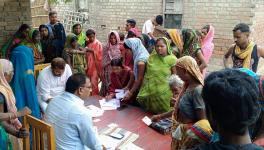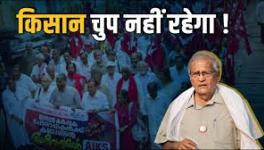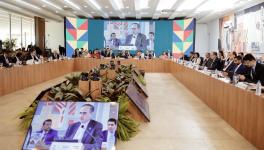Over 130 Civil Activists Demand Transparency in Ongoing FTA Negotiations

Representational Image. Image Courtesy: Freepik
New Delhi: Over 130 organisations and civil society leaders have questioned the "lack of openness" of the Indian government with regard to the ongoing negotiations on Free Trade Agreement (FTAs) with various countries, including the US, the UK, Israel and the European Union.
According to an open letter written to the Indian government on Tuesday, as published in Countercurrents, individuals and members of various organisations, said: “This non-consultative and exclusionary process” that “signals a disregard for the questions of human rights, social justice, and environmental impacts that wider stakeholder involvement would put on the table.”
Among some notable signatories to the open letter are Jawhar Sircar, Member of Parliament; Shailesh Gandhi, former Chief Information Commissioner; Madhu Bhaduri, former Ambassador; Medha Patkar, Narmada Bachao Andolan; Annie Raja, National Federation of Indian Women; Teesta Setalvad, Social Activist; Gautam Mody, NTUI; Viju Krishnan, All India Kisan Sabha; Benny Kuruvilla, Focus on Global South, Prafulla Samantara and Meera Sanghamitra, National Alliance of People’s Movements; Nikhil Dey, Mazdoor Kisan Shakti Sangathan; Navsharan Singh, Researcher, M G Devasahayam of People First among others.
The letter is especially relevant in the context of the fifth round of trade negotiations with the European Union going on in Brussels. Trade agreements between India and the 27-nation bloc were halted eight years ago, resuming recently in June of 2022. The EU is India’s third largest trading partner, accounting for €88 billion worth of trade in goods in 2021 or 10.8% of total Indian trade.
According to the signatories, the only exposure to the ongoing European Commission (EC) proceedings that they are getting is through occasional tweets on the progress of the negotiations and brief press notes from the Commerce Ministry about the visit of high-level delegations, which are "aimed at captains of business and industry and the foreign media."
“The millions of farmers, workers, artisans, fisherfolk, small businesses, gig workers, home-based workers and others who will be affected by these FTAs,” says the letter, “are completely invisible in these communications”
The signatories also pointed out that the government was refusing to provide even basic details about the negotiations.
The letter states “An application submitted under the Right to Information Act, 2005 (RTI Act) seeking information about the agenda and the minutes of ministerial meetings with visiting EU delegations, representations received from business and trade representatives seeking to influence India’s position in the trade talks has been rejected by the Commerce Ministry on grounds of national security and trade secrets”
However, when it comes to the EC’s own stakeholders, substantive reports of the four rounds of negotiations completed and the textual proposals submitted to the Government of India are all available on the website of the European Commission, for any person anywhere on the planet to access free of charge, the letter adds.
The letter also pointed out the “glaring absence” of India’s response to these proposals as well as their own proposals on these matters. “Maintaining opacity about India’s position on matters of immense public interest and importance can, unfortunately, give rise to serious suspicion as to whether the Government is being nose-led in the course of these talks”, it adds.
The additional fact that India refuses to consult with Parliament on FTA-related matters also provides no relief, says the letter, adding that “the FTAs could result in the amendment or even scrapping of several Central legislations that are firmly in the domain of Parliament. Parliament must therefore deliberate on the implications of the proposed legislative changes for the lives, livelihoods, and well-being of all citizens, particularly the most vulnerable groups”.
The signatories called upon the Union government to provide open access to the proposals submitted to the EU, and to the textual proposals received and responses submitted to other trading partners with whom FTA talks are going on.
The letter also called for creation of forums and platforms for public stakeholders to ensure “effective public participation” in the process so that every citizen is informed of any decision that may affect their lives and livelihoods.
Read the full letter below:
Open Letter to the Government of India
WE, CITIZENS OF INDIA AND REPRESENTATIVES OF ORGANISATIONS named below, are deeply concerned at and anguished by the lack of transparency and non-inclusive consultation processes adopted by the Union Government in the negotiations with a several countries such as the United Kingdom, United States of America, Canada, Israel and the European Union for entering into free trade, comprehensive economic partnership or investment related agreements. Despite its twin promises of greater openness in government and cooperative federalism, the NDA Government continues to pursue opaque and limited consultation processes that characterised similar free trade agreement (FTA) negotiations with other countries under previous regimes.
Even as we express our concerns on the subject, the European Commission (EC) is holding consultations and dialogues with civil society stakeholders in the EU member-states on the social impact assessment (SIA) of the proposed FTA with India. Meanwhile, we in India, are expected to be satisfied with an occasional tweet on the progress of the negotiations and brief press notes from the Commerce Ministry about the visit of high-level delegations. The rare statements made by the Commerce Minister or the Foreign Minister are aimed at captains of business and industry and the foreign media. The millions of farmers, workers, artisans, fisherfolk, small businesses, gig workers, home-based workers and others who will be affected by these FTAs are completely invisible in these communications.
In addition to its failure to proactively engage and share information with different stakeholders, the Union Government is also rejecting formal requests for even basic details about such matters. For example, an application submitted under the Right to Information Act, 2005 (RTI Act) seeking information about the agenda and the minutes of ministerial meetings with visiting EU delegations, representations received from business and trade representatives seeking to influence India’s position in the trade talks has been rejected by the Commerce Ministry on grounds of national security and trade secrets (see Annexure-1 and 2 for the text of the RTI application and the Ministry’s replies).
The Union Government’s rejection of even formal requests for information flies in the face of the mandate of the RTI Act for meaningful transparency in governance and stands in sharp contrast to the EC’s openness vis-a-vis its own stakeholders. Substantive reports of the four rounds of negotiations completed and the textual proposals submitted to the Government of India are all available on the website of the European Commission, for any person anywhere on the planet to access free of charge. What the EU is proposing for inclusion in the FTA on more than 20 topics such as trade in goods, services and investment, government procurement, intellectual property, sustainable food systems, small and medium-sized enterprises, digital trade, capital movements and state-owned enterprises are all publicly available on this website. The EU has even presented a textual proposal for both voluntary publication of information and responding to formal enquiries from persons about matters covered by the FTA. Unfortunately, there is no official intimation on this side of the Mediterranean about India’s response to the EU’s proposals or its own textual proposals about these matters. Maintaining opacity about India’s position on matters of immense public interest and importance can unfortunately give rise to serious suspicion as to whether the Government is being nose-led in the course of these talks.
Of particular concern to us is also the absence of an obligation on the Union Government to consult with Parliament on FTA-related matters. The Constitutional scheme of division of powers grants the Union Government a monopoly over matters relating to bilateral and multi-lateral treaties, including FTAs. Parliamentary approval post facto is also not mandated by the Constitution because the power of ratification also vests with the Executive i.e., the Union Government. However, the FTAs could result in the amendment or even scrapping of several Central legislations that are firmly in the domain of Parliament. Parliament must therefore deliberate on the implications of the proposed legislative changes for the lives, livelihoods and well-being of all citizens, particularly the most vulnerable groups.
The Commerce Ministry’s reply to one of the RTI queries states that it is holding consultations only with Industry Associations and relevant Ministries and Departments. This does not inspire much confidence. It is a matter of grave concern that State governments have not been consulted, despite the fact that FTAs cover subjects under the State List and the Concurrent List. The Union Government has also not opened up the consultation process to farmers’ associations, labour unions, environmental rights and human rights groups, consumer associations and many others who are legitimate and critically important stakeholders.
This non-consultative and exclusionary process signals a disregard for the questions of human rights, social justice and environmental impacts that wider stakeholder involvement would put on the table. We are concerned that ignoring these concerns at this stage will also undermine or short-circuit mandatory processes of environmental and social impact assessment.
On the other hand, we note that the EU has initiated consultations with civil society stakeholders to ascertain their views about the areas covered by the proposed FTA with India.
Given this starkly visible imbalance in the practice of transparency and inclusive consultation processes adopted by the negotiating partners, we demand that the Government of India immediately take the following steps.
1. Give wide publicity and provide open access to proposals submitted to the EU by Government of India, as well as the responses to the textual proposals tabled by the EU which are publicly available.
2. Give wide publicity and public access to the textual proposals received and responses submitted to other trading partners with whom FTA talks are going
3. Create forums and platforms for public stakeholders and experts including civil society, academia and media representatives to submit their views on ongoing FTA negotiations with the EU and other
4. Ensure effective public participation in the negotiations by providing timely and comprehensive information on the status and details of the negotiations and holding dialogues and consultations with public stakeholders in India at each stage so that the negotiations are informed by the views and aspirations of all
List of Signatories:
|
|
Name |
Profession/Affiliation |
City |
|
1. |
Aasin Khan |
Social Activist |
Alwar Rajasthan |
|
2. |
Abirami Raveendran |
Unite |
London |
|
3. |
Adv Dr Shalu Nigam |
Lawyer |
Delhi NCR |
|
4. |
Ajaykumar VB |
Equitives Foundation |
Trivandrum |
|
5. |
Albertina de J. P. Almeida |
Advocate |
Panaji, Goa. |
|
6. |
Amani |
Student |
Delhi |
|
7. |
Amita Joseph |
Advocate |
Delhi |
|
8. |
Amitava Choudhury |
RTI Activist |
Kolkata |
|
9. |
Anand Athialy |
Student |
Pune |
|
10. |
Anantharamakrishnan Senthivel |
Assistant Professor of Criminology and Criminal Justice Administration |
Chennai |
|
11. |
Anasuya Chandy |
Teacher |
Madanapalle |
|
12. |
Anil Chawla |
Retired Army officer |
Delhi |
|
13. |
Anita Cheria |
Open Space |
Bangalore |
|
14. |
Anita Kapoor |
Social worker |
New Delhi |
|
15. |
Annie Raja |
G. Sec., National Federation of Indian Women |
New Delhi |
|
16. |
Anuradha |
Development Professional |
Bangalore |
|
17. |
Anuradha Banerji |
Saheli Women’s Resource Centre |
Delhi |
|
18. |
Ardhendu Sen |
retired govt servant |
coimbatore |
|
19. |
Arun Kumar |
Retd Professor |
Gurgaon |
|
20. |
Arun Mohan |
Media Collective |
New Delhi |
|
21. |
Aruna Rathnam |
none |
Chennai |
|
22. |
Arundhati Dhuru |
NAPM |
Lucknow |
|
23. |
Ashalatha S |
MAKAAM |
Hyderabad |
|
24. |
Ashok Maridas |
Samvidhaanada Haadiyalli |
Bangalore |
|
25. |
Ashok Shrimali |
Social Activist |
Ahmedabad |
|
26. |
Avinash Kumar |
Researcher |
New Delhi |
|
27. |
Beena Pallical |
Independent Activist |
New Delhi |
|
28. |
Benny Kuruvilla |
Focus on the Global South -India |
Delhi |
|
29. |
Brinda Adige |
Activist |
Bengaluru |
|
30. |
Brinelle D’souza |
Chairperson, Centre for Health and Mental, School of Social Work Health, Tata Institute of Social Sciences |
Mumbai |
|
31. |
Cedric Prakash |
Human Rights and Peace Activist/Writer |
Ahmedabad |
|
32. |
Chinmayi Naik |
Working Peoples’Coalition |
Bangalore |
|
33. |
D Gopalakrishna |
Socialist Party, India |
Bangalore |
|
34. |
Dev Desai |
ANHAD |
Ahmedabad |
|
35. |
Devaki Jain |
Feminist economist |
New Delhi |
|
36. |
Devidas Tuljapurkar |
AIBEA Trade Union |
Mumbai |
|
37. |
Dhirendra Panda |
Social Work |
Bhubaneswar |
|
38. |
Dimple Oberoi Vahali |
Independent activist |
Delhi |
|
39. |
Dinesh Abrol |
Academic JNU TRCSS |
Delhi |
|
40. |
Divya |
Working |
Bhopal |
|
41. |
Divyansh Khurana |
Lawyer |
Delhi |
|
42. |
Dolphy Dsouza |
The Bombay Catholic Sabha |
Mumbai |
|
43. |
Dorothy Fernandes |
Social Action |
Patna |
|
44. |
Dr. Sanjay Mangala Gopal |
|
[Message clipped] View entire message
Get the latest reports & analysis with people's perspective on Protests, movements & deep analytical videos, discussions of the current affairs in your Telegram app. Subscribe to NewsClick's Telegram channel & get Real-Time updates on stories, as they get published on our website.
























